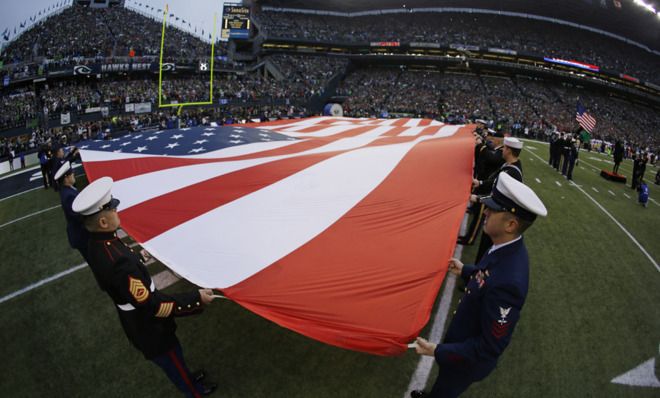America should treat all poor people as well as it treats poor veterans
Conservatives often get a free pass to trash welfare recipients while maintaining reverence for the troops. Enough is enough.

A free daily email with the biggest news stories of the day – and the best features from TheWeek.com
You are now subscribed
Your newsletter sign-up was successful
The message about American soldiers is almost always the same across partisan lines: They are hard-working, courageous, brave heroes, the essence of upstanding, wholesome, and industrious citizenry.
This picture may well be true. But there's a troubling underbelly to this ideal: Our culture's respect and admiration for the troops is matched in extremity by its disrespect for the poor.
The poor in this country are often described in polar opposite terms of those employed to exalt soldiers. The poor are takers, morally degenerate, lazy, and so welfare-addicted that they can't even have life dreams and projects. In our depictions of soldiers and veterans, we construct paragons of virtue. In our depictions of the poor and downtrodden, we construct paragons of vice.
The Week
Escape your echo chamber. Get the facts behind the news, plus analysis from multiple perspectives.

Sign up for The Week's Free Newsletters
From our morning news briefing to a weekly Good News Newsletter, get the best of The Week delivered directly to your inbox.
From our morning news briefing to a weekly Good News Newsletter, get the best of The Week delivered directly to your inbox.
However, lurking behind this contrast is an uncomfortable reality: The two groups substantially overlap.
In 2011, nearly 1 in 7 of our country's homeless were veterans, nearly 1 in 3 veterans between the ages 18 and 24 were unemployed, and veterans lived in 1 in 5 households poor enough to qualify for low-income heating assistance. Last year, nearly 1 million veterans were on food stamps, and many more doubtlessly received low-income transfer payments like the Earned Income Tax Credit, the kinds of transfers being pilloried by those who decry the "47 percent."
The poor are often veterans, and veterans are often poor.
This fact occasionally puts conservative lawmakers and commentators who heap disdain on the poor in very tough spots. After all, how do you level rhetorical attacks on the poor and the programs that serve them without also attacking the poor veterans whom we lionize in their capacity as former soldiers?
A free daily email with the biggest news stories of the day – and the best features from TheWeek.com
One way conservatives deal with this tension is to just flatly exclude veterans from their welfare bashing. So for instance, when Senate Republicans sought an accounting of all of the means-tested benefits paid out by the federal government each year, they directed the Congressional Research Service to specifically exclude means-tested welfare programs for veterans. After all, if you are going to construct a list of programs that you intend to trash as wasteful, you can't have it include means-tested veterans' health care and means-tested veterans' pensions. That would be far too disrespectful and intolerably dissonant with pro-troop messaging.
On the liberal side of the aisle, the existence of poor and economically suffering veterans presents a huge rhetorical opportunity, but one that the left constantly manages to bungle. Right now, big name Democrats talk about poor veterans in ways that tend to preserve the notion that they are particularly special. So for instance, when Cory Booker discussed the impact of cutting unemployment insurance on veterans, he emphasized that this was a special crime because "these men and women who fought for our country … are not lazy." Instead of using this opportunity to defend the poor at large, we get special pleading based on the notion that poor and struggling veterans are somehow different from and more virtuous than the other program beneficiaries.
The more sensible move here, both on the merits and politically, is not to sequester poor veterans off into their own special category of poor people. Such hiving off only reinforces the toxic and illegitimate distinction we make between the deserving and undeserving poor. Instead of separating veterans out, they should be depicted as being very much like most people who find themselves in economic trouble.
The reason why veterans — people who in prior years proved themselves capable of adhering to extreme discipline and undertaking grueling amounts of difficult labor — wind up poor or unemployed is because poverty and unemployment are mainstream conditions that affect huge swaths of our population, not just some mythical class of degenerate scum. Four out of five Americans spend at least one year of their adult life in or near poverty, jobless, or reliant on welfare. Over half of American adults spend at least one year of their life in poverty and nearly 1 in 7 Americans report having been homeless at some point in their life.
As the the President's Commission on Income Maintenance Programs pointed out in 1969, "our economic and social structure virtually guarantees poverty for millions of Americans. Unemployment and underemployment are basic facts of American life."
It's time to reform mainstream understanding of the poor. Ask yourself: If the exemplars of greatness in our society can fall into poverty and unemployment, then who else might be in those ranks alongside them?
-
 Political cartoons for February 14
Political cartoons for February 14Cartoons Saturday's political cartoons include a Valentine's grift, Hillary on the hook, and more
-
 Tourangelle-style pork with prunes recipe
Tourangelle-style pork with prunes recipeThe Week Recommends This traditional, rustic dish is a French classic
-
 The Epstein files: glimpses of a deeply disturbing world
The Epstein files: glimpses of a deeply disturbing worldIn the Spotlight Trove of released documents paint a picture of depravity and privilege in which men hold the cards, and women are powerless or peripheral